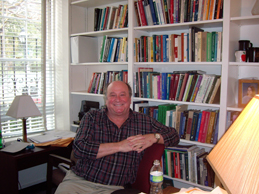Department of Political Science


Political science professor Dr. Arthur Felts was born in Kentucky but was raised in southwest Ohio. Felts attended Miami of Ohio then the graduate program at Pennsylvania State University. Felts went on to teach at four colleges: Morehouse College, East Tennessee State, Appalachian State and the College of Charleston.
Charleston became his home a mere five weeks before Hurricane Hugo hit Charleston in 1989. "So much for Southern hospitality," Felts quips. The small classes, emphasis on teaching and the beautiful campus are a few reasons why he wanted to stay at the College of Charleston.
Felts, a former longtime head of the College's Joseph P. Riley Center for Urban Affairs and Policy Studies, is now heavily involved with the Community and Regional Resilience Institute (CARRI). Felts is excited to be part of this program saying, "It actually has the potential to change the quality of peoples' lives."
CARRI is a program funded by the U.S. Department of Homeland Security. The program looks at prevention, protection, response and recovery to enhance the resilience of communities after natural disasters damage the area's infrastructure, economic and social systems. "We don't think that resilience is specific to any disaster but we think resilience is general," Felts says.
CARRI puts communities through an assessment to see what makes people attached to where they live. According to Felts, "Having a strong sense of place increases the community's ability to recover."
CARRI wants to measure what makes people want to come back to their community to rebuild and restore with their assessments. Having a high "resilience rate" is a positive for communities. Businesses could be more inclined to move to an area with a high resilience rate because there is a greater chance that their business will be restored and the city will be able and willing to recover. Families could also be more prone to move to a high resilience area so they feel better about what will happen to their house and community after a disaster.
For homeowners, this could have a positive affect on insurance rates. CARRI has made many strides to get to where it is now. According to the organization's website, "It is available now to assist communities, leaders and policy makers at all levels to understand and implement policies and procedures that protect citizens, communities and regions against severe disruptions by enhancing their resilience, increasing their ability to respond and recover quickly, effectively and efficiently."
Felts has impressed his colleagues with his involvement with CARRI. "Dr. Felts has done some really innovative and insightful work on human vulnerability to hazards in the Lowcountry and on building community resilience to those hazards," says fellow political science professor Kevin Keenan. "Through the CARRI Institute, Dr. Felts has engaged in academic leadership that helps policy makers and communities themselves think about fostering resiliency."
For the last year, Felts has not been working on CARRI projects that are specific to the Charleston area. Those have been taken over by what is called a "legacy organization," the Berkeley-Dorchester-Charleston Council of Government, who will continue to make progress in Charleston and have now institutionalized these ideas into their organization.
Felts is now working with groups from Jackson State University in Alabama, people from Homeland Security, the Savannah River National Lab and Oak Ridge National Lab. They have successfully completed the first draft of the assessment for resilience and it is now being passed to practitioners and subject matter experts, putting it in the second phase.
Among Felts many local-oriented initiatives as director of the Riley Center for Urban Affairs and Policy Studies was as principal investigator of the Hope VI project. Horizon Village is a public housing community located in North Charleston that was built, thanks to Hope VI. It has a mixed market: homes for sale at market price, homes for sale with subsidies and public housing. The idea is that people on welfare living next to people that are not on welfare could create a positive atmosphere.
Along with his research, Felts teaches a full load of classes in the political science department. He teaches master’s courses in public administration, public finance, and the capstone seminar.
After many years at the College of Charleston, Dr. Arthur Felts has been a leading asset to the College, making numerous significant contributions to the political science department and public administration graduate program.
For more information on the Community and Regional Resilience Institute, visit https://www.resilientus.org/.
###